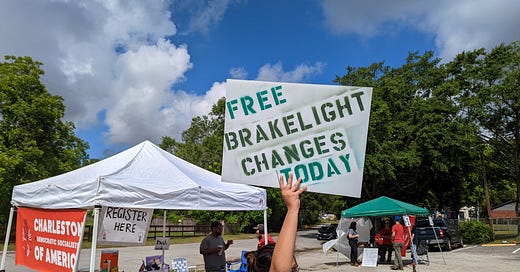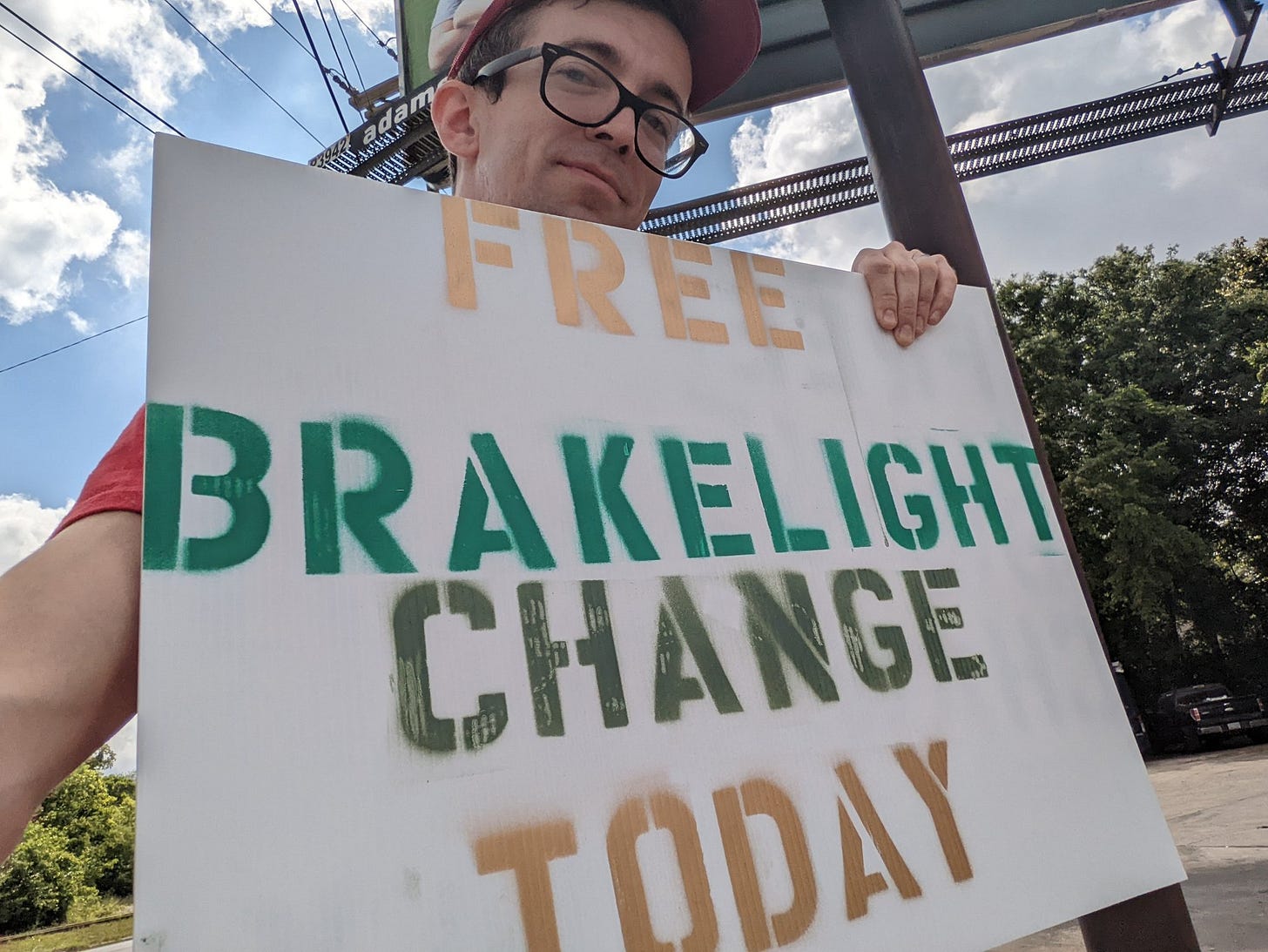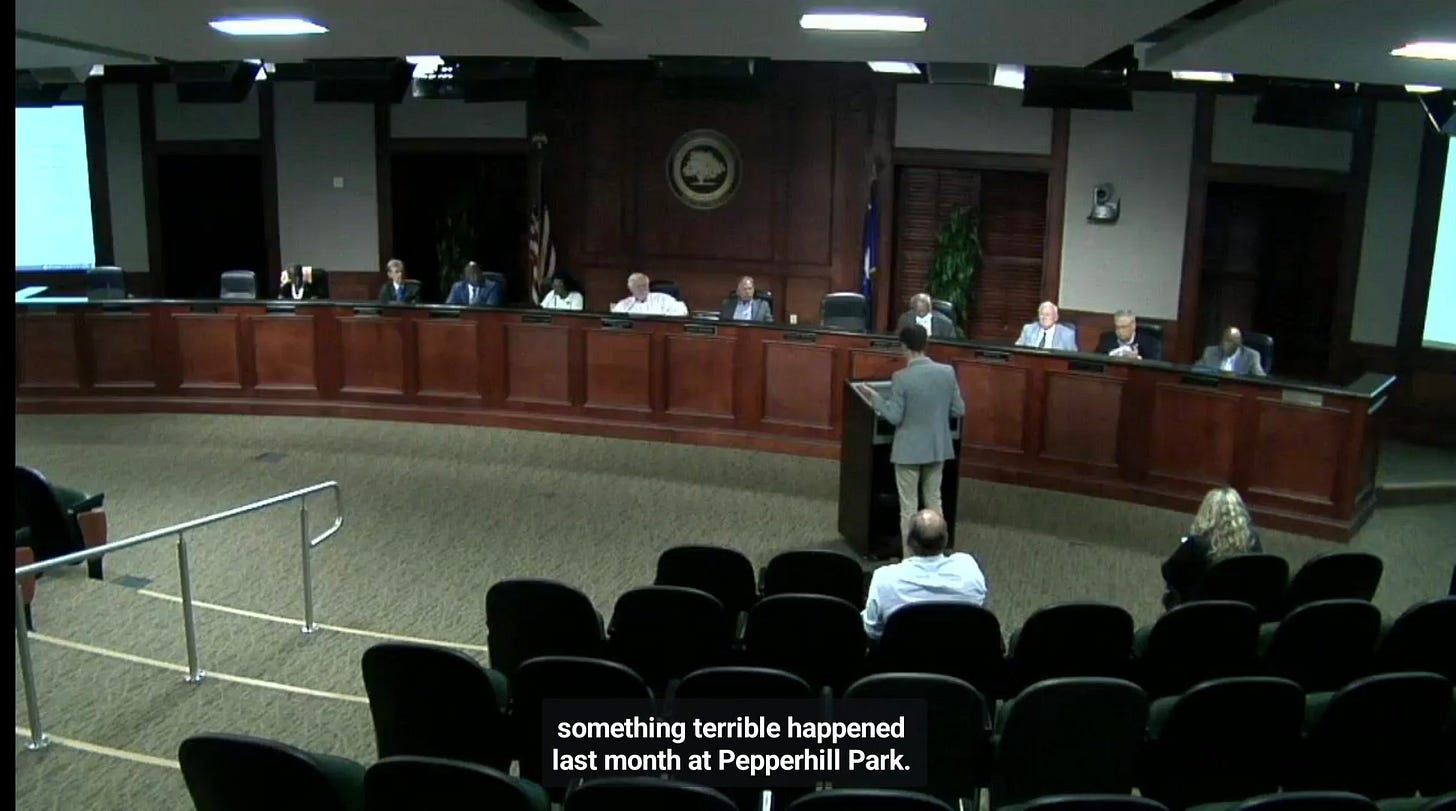This is how we keep us safe
A brake light clinic, a surveillance dragnet, and some free information
In my wild evangelical college days I would sometimes hand out tracts and strike up awkward small talk with strangers in the student union. Members of my ministry team had a set of conversation starters, but it was up to each of us to Steer the Conversation Toward the Lord.
There’s an art to the turn, and I never exactly mastered it. I wrote about my misadventures in campus proselytizing a couple of years ago:
I made the turn too sharply: “So, what do you think about Jesus?” I’d blurt out, and I’d see the look of betrayal in some freshman poli sci student’s eyes. It’s the look you give when you realize you’ve been duped by a corny sales pitch.
I think it’s fine to share your beliefs with strangers, even unprovoked. But I still feel remorse about tricking people into conversations they didn’t want to have.
I was thinking about my old itinerant-preacher ways last weekend as some friends and I spread the good news of socialism here in North Charleston. Our little Democratic Socialists of America chapter spent most of the day Saturday in a parking lot beside Fresh Future Farm changing people’s car brake lights and turn signals for free. It was our first time hosting a brake light clinic, a mutual aid event inspired by the work of another DSA chapter in New Orleans.
We absolutely had an agenda, and we announced it up front with flyers and big red banners and interviews on the evening news: We were there to change brake lights and resist the police state. Unlike my previous efforts at evangelism, the conversations pretty much steered themselves.
Broken tail lights were an easy conversation starter. One sweet woman with an elderly chihuahua in her passenger seat told me her daughter called the night before after seeing our Abolition Working Group co-chair talking about the brake light clinic on ABC News 4.
“Mom, you’ve gotta get that fixed,” she’d said.
Broken tail lights are one of the most common reasons why police pull drivers over for “pretextual” traffic stops, looking for an excuse to search their vehicles. By changing those lights for free and teaching each other how to do it, we aim to protect one another from traffic stops that can become expensive or even lethal.
Last month, 7 years after a North Charleston police officer shot Walter Scott in the back following a traffic stop for a broken tail light, Mayor Keith Summey told the local press he wanted police to ramp up pretextual stops again. That didn’t sit well with the people we met Saturday. North Charleston police have a well-earned reputation for overpolicing and racial profiling in Black and Latino communities.
We were on our third car of the day when someone asked what my shirt was about. I looked down and remembered I was wearing a chapter T-shirt (designed by the talented Comrade Bones) with our cheeky slogan “Cornbread and Roses” across the chest.
I explained that “Bread for all, and roses too,” was an old slogan used by suffragettes and striking workers, and it meant that everyone deserves not just to survive but to experience beauty. The cornbread part was our little bit of South Carolina flavor. That part got a laugh.
We changed about a dozen lights in all on Saturday and had some good organizing conversations with our neighbors. We handed out know-your-rights tracts for traffic stops. We got out in the warm sun and worked side by side with coalition partners from the ACLU of South Carolina and the People’s Budget Coalition. In a month of unremittingly grim news at the local, state, and national level, I’ll chalk that up as a win.
A murky surveillance sales pitch
We’d been planning the brake light clinic since 2021, but it suddenly became a lot more newsworthy in April after a shooting incident outside a youth baseball game. No one was injured, but parents were understandably shaken.
The police, who already command more than 30% of our city budget, used the opportunity to make a public case for mass warrantless surveillance. In the immediate aftermath, North Charleston Police Department officials announced, seemingly unilaterally, that they were going to set up a 24/7 surveillance center called a “Joint Operations Center” and install license plate readers and surveillance cameras covering “every inch” of the city.
This, combined with Mayor Summey’s public appeal for more stop-and-friskery from the beat cops, lent a certain urgency to our work. These technologies and techniques are an invasion of everyone’s privacy with a poor track record for reducing violent crime, and in particular they have been used to target and harass Black, Latino, and low-income people in communities across the U.S.
I live in North Charleston, so on Thursday night I went to City Council and spoke during the public comment session. You can watch my remarks here starting at the 28:30 mark or read them below if you like. (I ad-libbed a little in person; the text below is what I had originally prepared to say.)
Something terrible happened last month at Pepperhill Park. Young people exchanged gunfire outside of a youth baseball game. It shocked all of our consciences and struck fear into a lot of people, especially parents like me. I have 3 young children and I immediately thought about what I would do to protect them if this happened at their little league game.
I can appreciate the sense of urgency and the need to take action to keep our community safe. But I cannot sit by and watch city officials use this moment to launch an unprecedented and sweeping program of domestic surveillance and harassment on our streets.
In the wake of that incident, Mayor Summey bemoaned to the news that the police should be doing more pretextual traffic stops — pulling people over for broken tail lights and minor infractions as an excuse to search their vehicles. We know from experience, community input, and a mountain of data that this practice, much like stop-and-frisk, only leads to racial profiling and overpolicing of Black and Hispanic residents. It does not keep us safe, and I don't need to remind you that it didn't keep Walter Scott safe.
Deputy Chief of Police Ken Hagge also seized the moment of the ball field shooting to promote a sweeping program of domestic surveillance and targeted policing under the umbrella of a new Joint Operations Center equipped with facial recognition technology and automatic license plate readers. Police said they would install 745 new security cameras to cover “every inch” of the city, 24/7.
But we know that 745 cameras will not cover every literal inch. We know from experience that the surveillance, the traffic stops, and the searches and seizures will heavily target Black and Hispanic communities. I’ll read to you from page 8 of your own Racial Bias Audit summary:
“Community members expressed that NCPD officers seem to overly police certain areas, particularly neighborhoods with many residents living under the poverty level or residents of color. Listening session attendees reported feeling as though NCPD officers pulled them over every time they drove through their neighborhood, and that officers were profiling residents and regularly looking for minor infractions to justify traffic stops.”
As a North Charlestonian and as a parent, I don’t want to live in an open-air panopticon. I don’t want my privacy or the privacy of my neighbors violated. I don’t want our information shared with domestic surveillance agencies like ICE. We live in a state that already cages more of its population than any country on earth, and the “solution” we’re given again and again is to lock up even more of us. The proposals I have heard this past month are corrosive to civil liberties, to justice, and to the trust of our community. I know these plans are already in motion and it may be too late now, but to the extent that you can, I ask that you, the members of City Council, reconsider and reverse these programs.
I’m wearing my activist hat now, but I can’t turn off my old journalist instincts either, so I’ve spent some time digging into the “Joint Operations Center” proposal. I took some notes in this Twitter thread last night:


For starters, I haven’t seen an exact price tag on this plan, and I’d like to see the Requests for Proposals that led the police to pick the vendors (Verkada cameras, Rekor automatic license plate readers, Fusus surveillance data dashboards) they recently name-dropped in a meeting with city officials. I’m also highly skeptical of the efficacy of ShotSpotter, which one officer said would report the geographic location of gunshot sounds to the new dragnet. ShotSpotter is notoriously inaccurate, riddled with false positives triggered by fireworks, and police departments have been caught manipulating its data in other cities.
I have some basic due-diligence questions that I’ll be seeking to answer in the next few weeks. Speaking of due diligence …
Wanna hear some FOIA nonsense?
As I’ve mentioned previously, some teachers, professors, librarians, and I are trying to get our hands on records that South Carolina Education Superintendent Molly Spearman mentioned in a Feb. 16 S.C. House committee hearing. While arguing for state censorship of squishily defined “critical race theory” in classrooms, Spearman told Rep. Adam M. Morgan she had received “several hundred” complaints about CRT.
On April 8, we asked for copies of the emails she and her office’s ombudsman sent and received on the subject of CRT in the months leading up to her House testimony. While her office is still stonewalling us on that front, they did respond on Friday with a PDF of a spreadsheet containing summaries of … 18 email conversations. You can read those summaries here on Document Cloud.
According to the Freedom of Information Act officer’s subjective interpretation of those emails, only one of the email conversations included an allegation of a “CRT speaker” being allowed inside a school building. In that case, Spearman referred the matter to an official in the Greenville County School District office.
We’re not done here. In the meantime, I’ve uploaded the emails I received via a similar FOIA request last year in a searchable format on Document Cloud. Spearman has indicated she won’t run for re-election this fall, but in the event that the next superintendent continues this censorship campaign in coordination with state Republican leadership, we’ll be right here asking questions.
***
Here’s a running list of content for paid subscribers only. Here’s me on the internet:
Twitter // Bandcamp // Apple Podcasts // Spotify Podcasts // Bookshop







Great article, Paul. Great work -- keep it up.
I do enjoy your column even if I disagree with you on many things. It seems rather disingenuous to describe what Charleston is going to do as “mass warrantless surveillance” when you do not need a warrant to observe public places, and if somehow, this surveillance picked up private information, such as activities within a home that were not exposed to the public, such information could not be used in any criminal prosecution nor could any information gleaned from the illegally obtained information. While stop and frisk should be applied equally and in all neighborhoods, not just some, the efficacy of the policy in reducing crime is almost undeniable. Crime plummeted in places like NYC after the implementation of the policy which is ironic considering NYC is in the midsts of in unprecedented Crimewave currently after banning the practice. The proposition you put forth (that stop and frisk disproportionately affects people of color) doesn’t take into account one important thing; all laws of general application will disproportionately affect one group or another because each group engages in different behaviors. So I would encourage you to consider how you would craft a law that would ensure that everyone is affected equally because I don’t believe that it’s possible. Some will ALWAYS be effected at a higher rate than others. Good, thought provoking column.